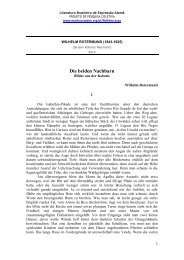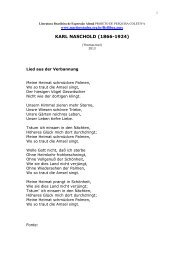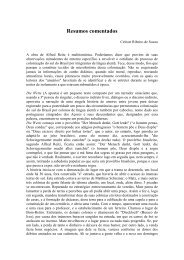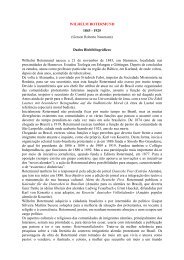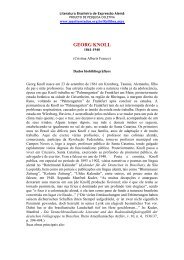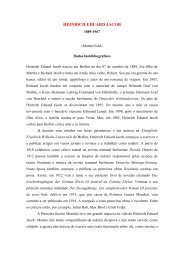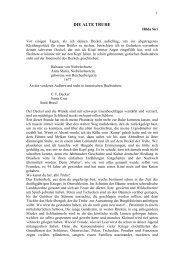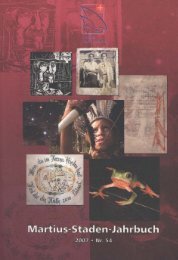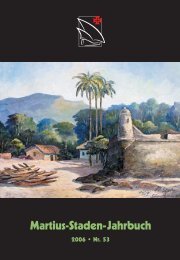Erfolgreiche ePaper selbst erstellen
Machen Sie aus Ihren PDF Publikationen ein blätterbares Flipbook mit unserer einzigartigen Google optimierten e-Paper Software.
164<br />
installation of the modus vivendi and political economy of<br />
local Germanism and of the constitution of an enlightened<br />
German self in the South. The installation of such a “modern<br />
reality” in that region was actually produced as a trauma,<br />
involving a deliberate and violent break of already fragile ties<br />
between the individual and the collective, the dismissal as<br />
illegitimate of other ways of mapping that world, and the<br />
ingraining of imaginary foundations for identity-making and<br />
group membership based on German Kultur. I argue that the<br />
Mucker War both revealed the imbalance of an immigrant<br />
culture and accelerated the process of its mutation. Drawing<br />
from missionary reports, military documents, and newspapers<br />
of the times, I want to bring to mind the intensity of<br />
such a cultural change and symbolic loss experienced in the<br />
flesh of the so-called Mucker.<br />
A cultura colona e o imaginário alemão<br />
“Não se acha religiosidade no Brasil”: palavras do pastor Hermann Borchard,<br />
pioneiro da campanha para sinodalizar as comunidades evangélicas no sul do país.<br />
O missionário alemão documentou esta suposta irreligiosidade no primeiro relatório<br />
que enviou aos seus superiores eclesiásticos em Berlim, logo após a sua chegada em<br />
São Leopoldo, no início de 1865. De 1854 a 1861 (depois de ter concluído seus<br />
estudos em Könisberg), Borchard trabalhou nos Estados Unidos junto ao Sínodo<br />
Luterano da América do Norte. De volta à Alemanha, exerceu a chefia da União<br />
Berlinense para os Emigrantes Alemães Evangélicos e da Sociedade Evangélica para<br />
os Protestantes Alemães na América do Norte. Entre viagens e conferências, assumiu<br />
ainda um pastorado em Barmen por um ano e meio. “Livros descrentes, como o<br />
Evangelho da Natureza, romances ruins e escritos racionais acharam seu caminho<br />
para cá via oceano. Lêem-se mais romances do que a Bíblia. Os bailes reúnem mais<br />
gente do que a igreja. Não se conhece o descanso do sábado. Aqui, no entanto,<br />
ainda não impera uma descrença tão selvagem quanto nos Estados Unidos.” 1<br />
Na década de 1850, uma nova onda migratória trouxe ao Sul mercenários (die<br />
Brummer, ex-combatentes do Deutsches Reich), intelectuais e negociantes sem um proeminente<br />
background social na Alemanha. Após desertarem da Legião Estrangeira, muitos<br />
1. E. Z. B, Die Mission unter den Evangelischen Deutschen in Südbrasilien, 1/5/1865.



